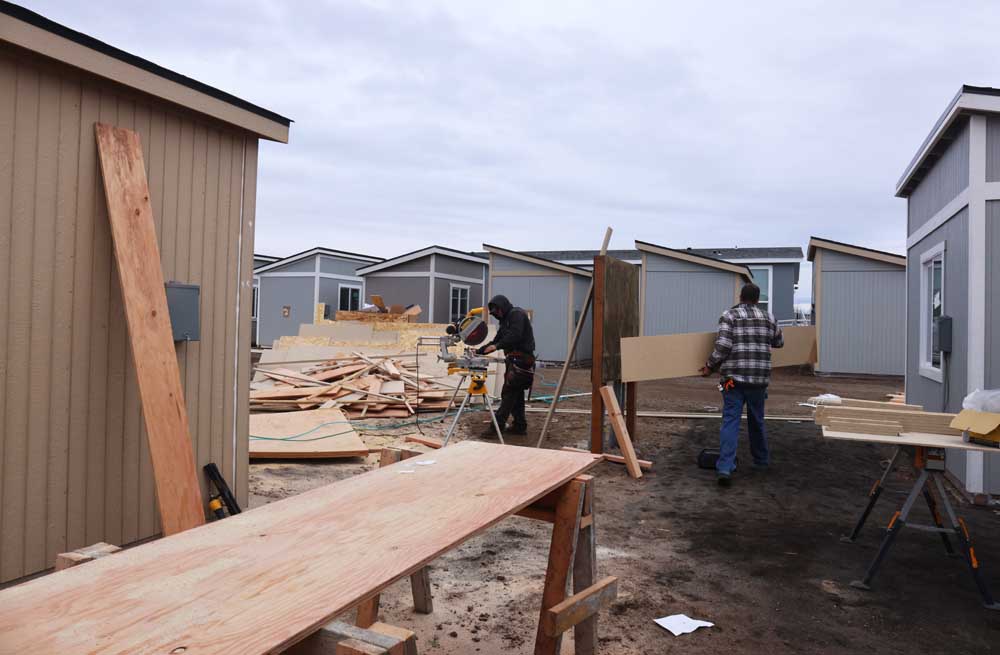Guest Column: What if we listened more to the people experiencing homelessness?
Published 5:00 am Sunday, May 26, 2024

- Construction of Oasis Village, a transitional housing project for homeless people, nears completion in Redmond.
An issue that harms our political process is that those most affected by legislation often have no influence in the decision-making process. This is especially true for houseless populations when decisions are intended to make the issue disappear, rather than there being a process whereby needs are considered and addressed. Even more telling is that the conversations themselves rarely include the voices of our neighbors in the houseless community.
We are two Bend students attending Portland State University in the grad school program for social work and are considering what could happen if there was a more robust conversation surrounding houselessness that centered the voices of those affected. What impact would it make on legislative priorities? Could the community begin to (rightly) see that these people are our neighbors; our friends, sons, daughters, fathers, and mothers; that their lives hold equal value; that their housing situation does not alter their humanity?
Trending
We spent time with various members of this community over the past month, and while we envision this being an ongoing project, we wanted to share what we’ve heard thus far.
We asked one person what they would share if they had a megaphone and they simply said: I’m nice, I’m a good person. Opening up, he shared about the emotional pain caused by the judgmental looks he receives from people that walk by and how they impact his self-worth. He shared that he receives Social Security benefits due to a disability, but his monthly $943 is insufficient to find any housing in Central Oregon without long-term rental assistance. Frustration mounted as he described the years of waiting to be selected in the HUD/Section 8 lottery. Without truly affordable housing those with disabilities will never be able to live unassisted in Bend.
A man in a wheelchair shared the complications faced in accessing medical care. Limited mobility and no transportation makes navigating across town to attend medical appointments an excruciating task.
Despite these challenges, the focus of what he shared was on what was working. There was a deep appreciation for the Mosaic Medical mobile clinic and the health workers operating it. He emphasized staff’s ability to provide him accessible medical care while simultaneously treating him as a full person, not someone tainted by sleeping outside. It became evident that accessible and compassionate healthcare services like this are what houseless folks actually desire.
While this issue is complex and often leads to conflicting viewpoints, it is our fervent belief that one catalyst for change will be listening empathetically to those experiencing houselessness — and amplifying their voices. Too often our approaches center our viewpoints and desires, yet we disregard those who most need to have their experiences heard. Houselessness is an inevitable result of systemic inequality and too often the conversation becomes one of individual blame.
Social progress is not linear, and there isn’t an expectation that amplifying voices within this community will provide a seismic shift, but we hope that these efforts, at minimum, offer a step toward hope, empowerment, and tangible solutions.
Trending
Houselessness is often an afterthought, an issue to be made invisible; a can to kick down the road. There is, of course, an inescapable irony in writing a column in our words — that seeks to amplify the voice of others. This is a cautious first step; an effort to promote the humanity of those often disregarded and ignored.
Can we set aside the partisan rancor — and authentically engage? Can we learn to see ourselves in the less fortunate? Can we recognize that we are all a few unexpected hardships from adverse situations?
A challenge: Whether liberal or conservative, we can listen. We can amplify the voices of those often silenced; we can humanize our neighbors; these sons, daughters, mothers, and fathers. Rather than seeing statistics or a “problem to be solved”, what could happen if we trusted the insight of those navigating this precarious reality?
Editor’s Note
Do you have a point you’d like to make or an issue you feel strongly about? Submit a letter to the editor or a guest column.








